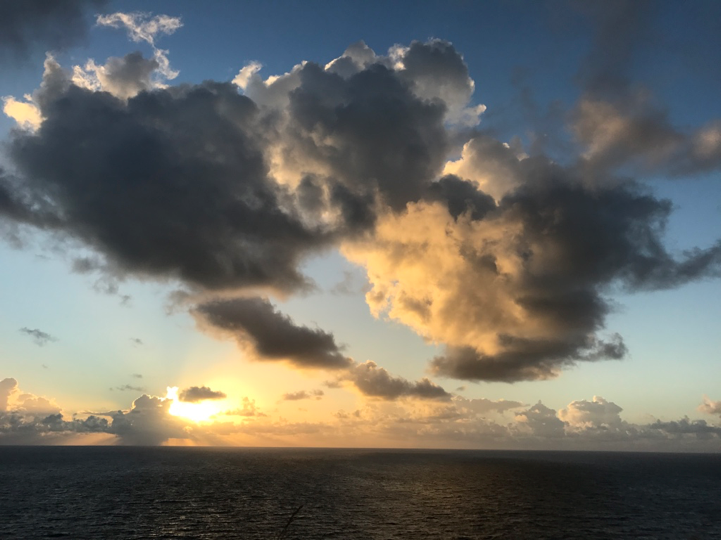This is a continuation of the post Recognizing Professor Olasee Davis: Part 2
On one of the last days working with our community partners, Professor Davis joins us at The Village (Virgin Islands Partners in Recovery) where a group of WSU students has been participating in the morning activities with women in the recovery program. Olasee Davis regularly hikes with people on their path to recovery, and he introduced me to The Village as a potential partner a few years ago. This has turned out to be a very successful work-site where our students have benefited tremendously. In 2016, Davis wrote an article about our travel study that was published in the Virgin Islands Daily News.
Of The Village, Professor Davis writes: “[It] is on a historic site at Sion Hill Estate, at over 300 feet above sea level. As you enter the historic pillars, it’s like you are going back in time in Virgin Islands history. You can’t help but feel the spirits of enslaved Africans who once worked on the estate along with their overseers and masters at Sion Hill.” He tells the group about Sion Hill plantation’s historical structures, and we take in the incredible view of the surrounding countryside of St. Croix. And he tells us about the enslaved Africans who labored here for decades. Davis describes this beautifully in his article:
Next was the moment of history. In the living room of the Great House, we gathered in silence as I began to lecture. We could hear and feel the wind blowing on our bodies as I spoke and unfolded the history of the Sion Hill enslaved Africans. I gave one of the students a list of names of slaves who lived on the plantation to read out loud. A moment of silence, please, then, the student proceeded to read the names: “Lucy, bought for 500; Maria, 700; Piggy, 400; Dorothy for 700” … the long list of names included men, women, and children.
The estate came alive when the audience heard the names of slaves. We all got emotional. It was a healing experience that day. The students and patients expressed themselves, some with tears running down their faces. The students walked away with a new understanding. The patients promised themselves to do all what they could to better themselves.
Believe me, Sion Hill estate is a living history of all of us.
I am thankful for the partnership and friendship Olasee Davis and I have formed over the years. His work with our students enriches their learning in ways that I could never replicate.
The final interaction with Professor Davis takes place at Point Udall, the easternmost point in the U.S. All who choose to do so gather at 4:15 am on their last day on St. Croix to fill coffee mugs and settle in for a 45-minute van ride across the island to watch the sunrise. Olasee Davis and Ranger Benito Vegas from the National Park Service join us. It is an incredible experience, and the students reflect on what they’ve learned over the last 18 days.
We thank Professor Davis for the time he’s spent with us. Winona State University students have been very fortunate to learn from an expert who has lectured to thousands of people throughout the Caribbean, North, South and Central America on topics including heritage tourism, eco-tourism, the environment, marine resources, agriculture, Virgin Islands natural and cultural history, and related sustainable life sciences.
Professor Davis has written over 6,000 articles for the Virgin Islands Daily News and the St. Croix Avis newspaper. He has co-authored several books on medicinal plants and other topics such as the colonial history of the Virgin Islands, and he has published scientific papers with universities in the U.S. mainland and in Denmark. Professor was honored as the “Environmentalist of the year” of the Virgin Islands in 1992 and University of the Virgin Islands “Employee of the Year” in 2007. In all, he had received over 300 awards for his work. He is an outspoken activist on environmental issues relating to the protection and preservation of the cultural, natural, and agricultural resources throughout the Caribbean region. He has helped protect and preserve historic and natural sites in the Virgin Islands by publishing articles in national magazines and local newspapers, appearing on radio talk shows and television programs, and testifying at court and public hearings, and testifying before the U.S. Congress.
Over the years, hundreds of WSU students have had the opportunity to learn about the natural, cultural, and environmental history of St. Croix from Professor Olasee Davis. WSU students and faculty are very grateful for the partnership we have formed with Davis and the University of the Virgin Islands. Professor Davis has enriched our understanding of St. Croix in profound and important ways.
–Dr. Tamara Berg, Professor and Director
Women’s, Gender, & Sexuality Studies at Winona State University
